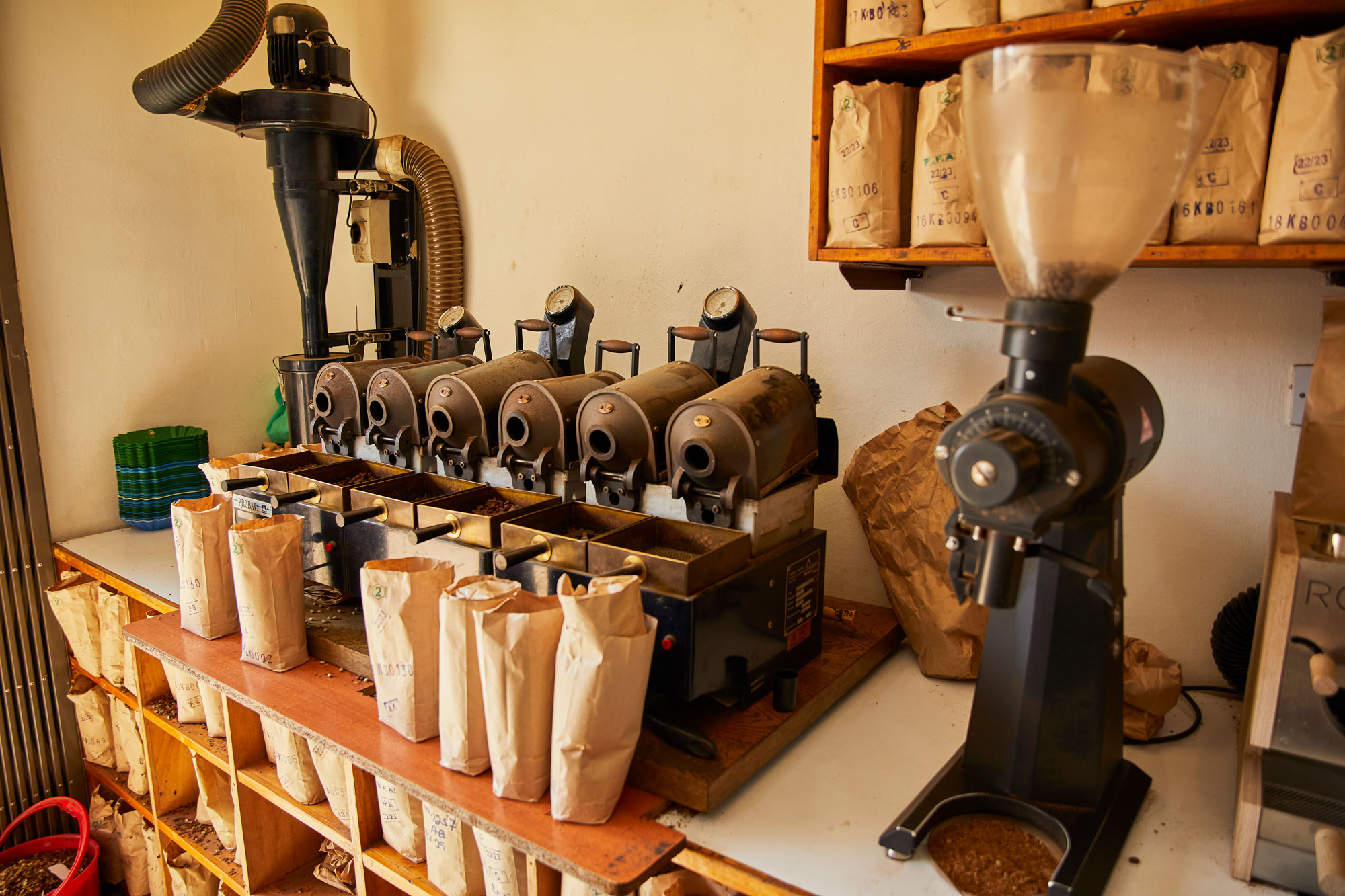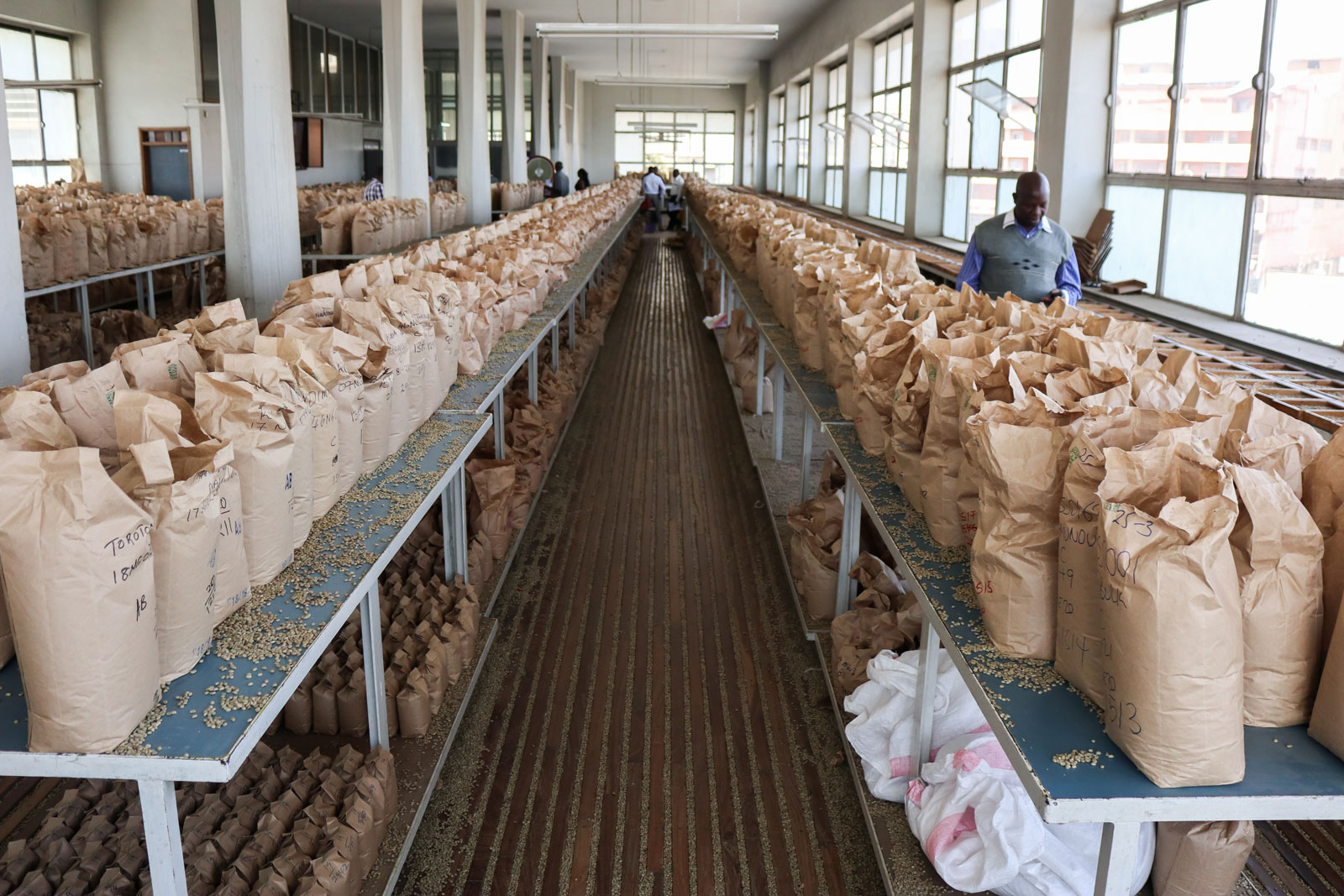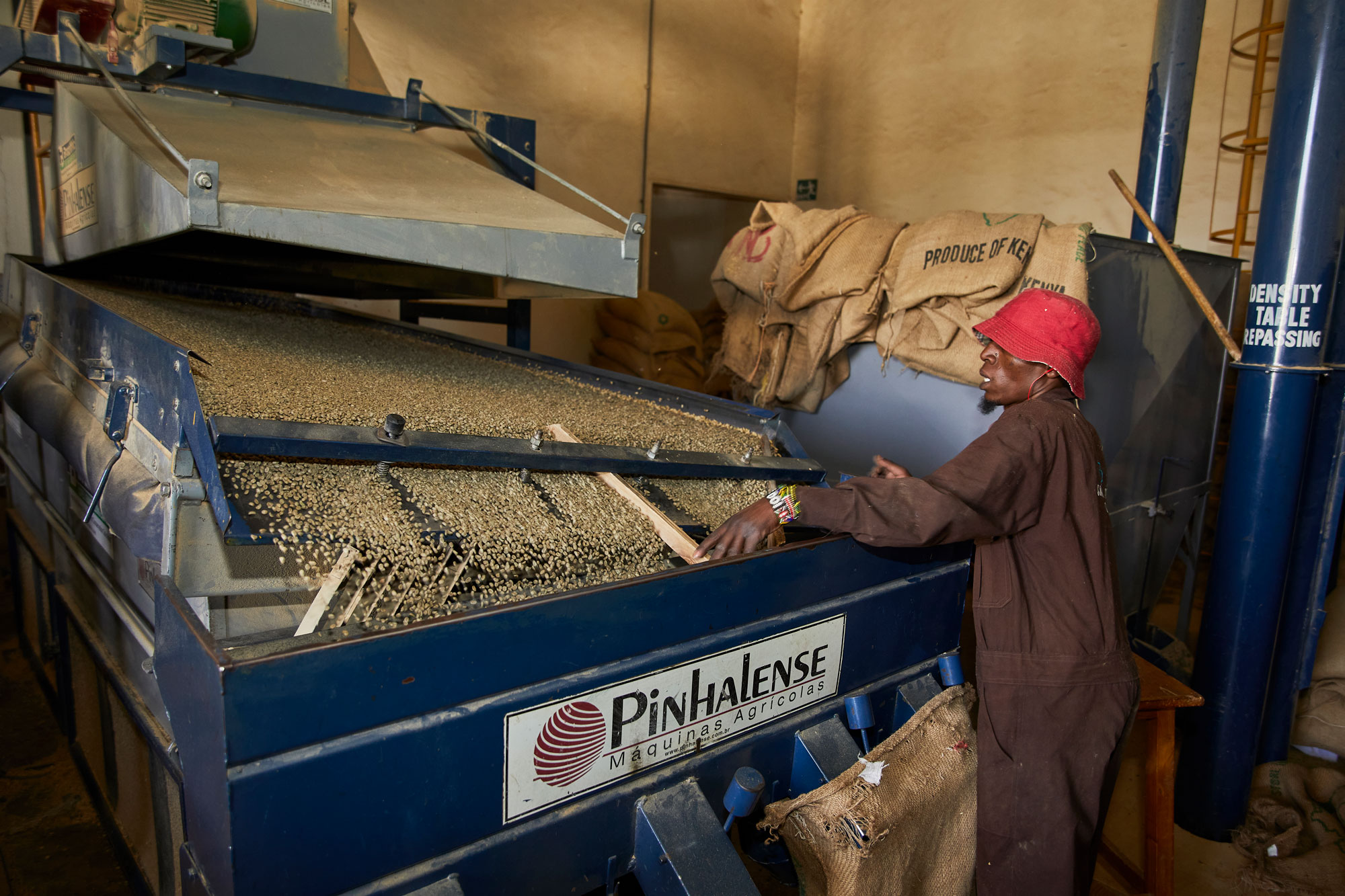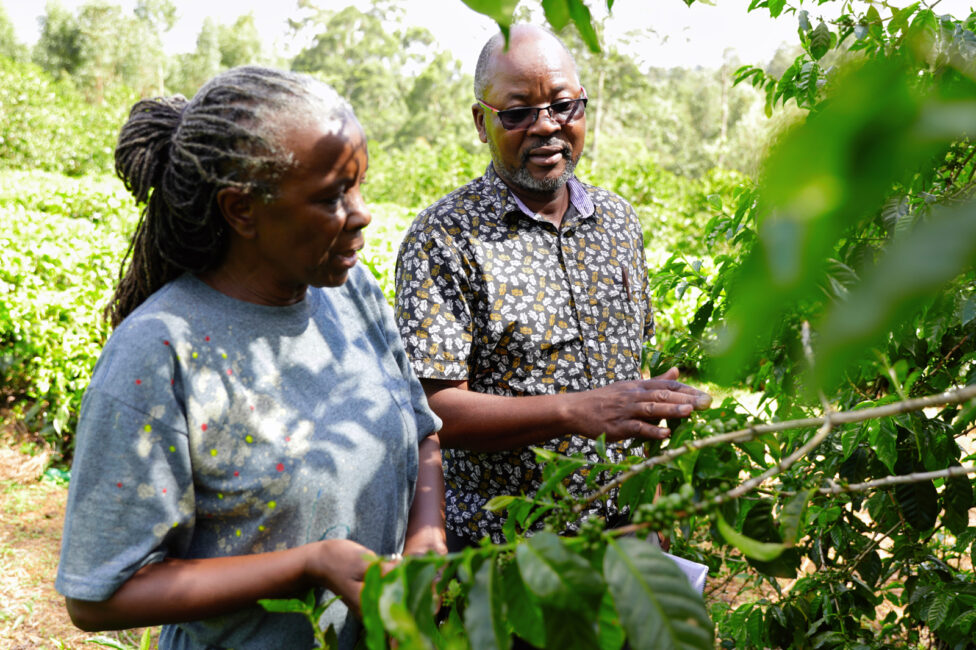The Big Kenyan Coffee Shake-Up: Part One
Published 7 May 2024.
Many long-time buyers of Melbourne Coffee Merchants’ Kenyan offerings will have noticed our line up looking a little different this year. The reason? Months after announcing the coffee sector needed to change, the Kenyan government introduced sweeping reforms to the trade model in late 2023, requiring a shift in how we buy coffee and the lots we were able to secure from the 23/24 season.
The new laws are designed to break up established trading structures and redistribute the control and financial gain of the industry from large, multi-national corporations to smallholder growers and cooperatives. While these reforms are undoubtedly necessary and largely contribute positively — as evidenced by Kenyan farmers’ support and enthusiasm for the new model — the haste with which they were implemented has caused confusion between growers, traders and buyers, and resulted in inefficiencies and increased risk for many parties.
We’ve spent the months leading up to and following the 23/24 harvest picking the brains of our partners and peers, including longtime friend and industry expert Wycliffe Murwayi, to better understand the historical context of Kenyan coffee trade and gain insight into the impact of the reforms. Over this two-part series, we’ll share what we’ve learned through many conversations, our own observations and careful research. Read on for Part One, covering how Kenyan coffee was traded before the reforms, what the reforms are attempting to address and how this has impacted trading this year.
Part Two covers how MCM is working in these new circumstances and our goals and priorities for future trading.
Historically, how was Kenyan coffee traded?
After being introduced by French missionaries in the 1800s, coffee was first commercially produced in Kenya at the start of the 20thcentury. By 1920, it had become the country’s main export crop, and in 1933 the Kenyan Coffee Board was established to set up the country’s famous auction system, which creates a direct correlation between a coffee’s quality and the price it attracts.
Initially, the auction model was designed to serve colonialist estate owners, who controlled most of the country’s coffee production and exports until the mid-20th century. In the 1950s and 60s, land reforms were enacted, giving Kenyan nationals the opportunity to own land and produce coffee. For decades, their coffee was sold only via auction at the Nairobi Coffee Exchange (NCE).
Kenya’s auction system is considered by many to be the most transparent and effective price-discovery and distribution mechanism for fine green coffees anywhere in the world, and inspired the Cup of Excellence auction model. Today most of the coffee bought and sold in Kenya is still traded via the auction system; while legislation introduced in 2006 enabled foreign green buyers to purchase coffee outside of the auction, over 90% of Kenya’s production is still traded through the Exchange.
Who were the main parties of this trading model?
There were four main parties in this trading model: the grower (referring to an independent farmer or member of a cooperative), the marketing agent, the miller and the trader.
- The growers have the most straightforward role to explain. They grow and process coffee cherry, to sell for profitable prices. Farmers with the means and required acreage to establish their own factories (as wet mills are known in Kenya), wash and dry their crop on-site, eventually delivering dried parchment to a dry mill. These farmers have more control of how their coffee is sold, because they can choose which marketing agent they work with. Most smallholders lack the resources to process their own crop, however, and must join local cooperatives instead, delivering whole cherry to centralised processing sites. For these growers, once they deliver their crop, control over how it is sold is ceded to the co-op. Theoretically, the board of the cooperative chooses to work with marketing agents who offer the greatest benefits to its members.
- The marketing agent is licensed by the government to work on behalf of a farmer or cooperative to secure milling services and market their coffee to traders. Their main role is to facilitate the highest sale price of the milled coffee, by assisting the grower to achieve the best quality and yields during the growing and harvesting season. This includes any agronomical advice that can help improve a grower’s practices at their farms, and the milling and preparation required for green coffee to be taken to auction or readied for export. Marketing agents prepare their catalogue of available coffees and submit samples to the NCE, where the auction occurs every Tuesday. As Wycliffe summarises, “A marketing agent is mandated to act for both the farmer and the buyer. After a direct sale, the agent then takes charge of the coffee at the warehouse and does all the logistics for shipment. The agent also performs any instructions or requests from the buyer — like consolidating lots, repacking, sorting, repackaging and documentation. The agent does not take possession of the goods at all.”
- The miller is licensed by the government to prepare dry parchment for auction or direct sale. County mills are owned and operated by the state government, while private mills are independently owned and are often affiliated to a particular marketing agent and larger, international trader.
- The trader is licensed by the government to buy coffee at auction, or directly from a farmer or cooperative, and arrange for its export.

To ensure the coffee grower was protected at every step of the chain, Kenyan law prohibited (and still does) a single company from operating as the grower, marketing agent, miller and trader — however, prior to the 2023 reforms, different agents were allowed to be affiliated under a parent company as long as each party was dedicated to its particular service alone.
While marketing agents, mills and trading houses can act independently, it became common over recent decades for large, multi-national trading corporations to own and operate one (or more) of each part of this supply chain as an affiliated organisation. This comes with advantages and risks for the farmer and buyer, who both needed to employ these parties to trade coffee.
The advantages included:
- A healthy competition amongst marketing agents. In this system, marketing agents were contracted by the grower or cooperative, meaning they had to offer good incentives to attract or maintain business. This might include agronomy training and advice, pre-financing or discounted inputs like fertiliser or pesticide, assisting in achieving certifications or facilitating sustainability projects or social initiatives. Marketing agents with a large, profitable parent company could afford to offer such incentives, positively impacting a farmer’s potential and profitability.
- A streamlined path to direct sales outside of the auction system. Within this system, buyers working with a particular trader would have access to coffees sourced through their affiliated marketing agent and mill before the coffee went to auction. This gave buyers like MCM the confidence in the repeated availability of offerings from a particular estate, meaning we could safely invest time and resources into developing a direct relationship with the farmer, and in the marketing and promotion of their coffee lots. Quality-focused growers and cooperatives could connect with likeminded buyers and leverage the demand for their coffee into higher prices.
The risks included:
- Given the number of players involved and the lack of oversight over every moving part, the framework of this system was riddled with opportunities for farmers to be exploited, or corruption to occur (as Chris Feran aptly wrote about in 2021). Marketing agents, particularly, could be quite liberal in their promises when trying to attract new farmer or co-op customers, with no accountability if these promises weren’t met.
- There was perceived and real opportunity for collusion between affiliated marketing agents (who represent the farmer) and traders (who represent the buyer) to keep pricing low or minimise transparency on the profit margins earned.
- A cooperative’s management team chooses the marketing agent, providing a potential window for corruption and outside influence (e.g. Chairperson accepting a kickback for employing a particular marketing agent).
- The management of a cooperative is, by law, re-elected every three years, and different managers may have affiliation with different agents — potentially creating less stability or longevity in the relationship between the grower, trader and buyer.
- Farmers could more easily be left in the dark about how much green coffee their cherry or parchment was yielding, how it was being sold (direct or via auction) and to whom — disempowering them from any price negotiations that relate to their actual cost of production in any given year.
- Buyers could also easily be left in the dark as to where their money was going — and how much of it actually made it into the farmer’s pocket. While marketing agents, millers and traders all provide essential services, if the buyer is only connected directly to one party (the trader) it can be challenging to get full transparency on the price paid for a coffee down the supply chain.
What is the origin of the 2023 coffee reforms?
Reforms to the coffee sector are nothing new in Kenya. As the country’s coffee exports have continuously dropped in the last 35 years, the national government has sought a variety of ways to revitalise the sector and incentivise farmers to continue its production. The Coffee Act 2023 seeks to do this by breaking up what they have deemed as “cartel behaviour” from large, multinational umbrella companies who control most privately managed players in the supply chain. The proposed result is, theoretically, to ensure farmers fetch a higher share of the profits the crop earns. As Wycliffe explains of the changes, “The Kenyan government has recently passed new laws to limit the number of roles an entity can perform in the chain. For example, an exporter is no longer allowed to be a miller […] The current model is no different from the previous one, except in the distribution of roles.”
What is the current status of Kenya’s coffee sector change?
- In June 2023, the Nairobi Coffee Exchange was closed for nearly three months while new reforms were implemented.
- Licenses for private dry mills were rescinded though, controversially, a few have been reinstated since.
- Publicly owned and operated county mills were allowed to continue to operate.
- Licenses for marketing agents were rescinded, and a new “coffee broker” license was introduced to replace this role. The broker is an independent party who receives a 2% fee from the grower to represent their coffees at auction (although they do not offer the additional services that a marketing agent used to offer).
- Traders are focusing solely on buying and selling within the auction system.
- Direct sales are permitted between growers and buyers, through an independent coffee broker. The point of transaction between a grower and a buyer is for clean, milled coffee (similarly to when coffee is sold the auction) but does not include additional pre-export services such as special preparation (defect sorting), packaging, consolidation, transportation or financing.
- A Direct Settlement System has been introduced, which ensures farmers will be paid within one business day after their coffee is sold at the NCE.
What was the reality of the reforms during the 2023-34 harvest?
The swift move to introduce the reforms ahead of the main harvest was supposed to improve the transparency of trade and increase the farmers’ income for the 23/24 season. In actuality, the haste in which the changes were made has caused widespread confusion and challenges — most significantly for specialty buyers (like Melbourne Coffee Merchants) who would have previously bought outside of the auction.
One notable effect of the reforms is the bottleneck at county mills around the country. With private mills previously processing some 90% of the country’s crop, the speed with which coffees could be processed — and therefore be taken to auction — slowed to a crawl. For many farmers who had already delivered their fly crop to private mills ahead of the licenses being revoked, the change involved having to relocate their parchment to a county mill, at their own expense. Once there, there were no guarantees that the coffee would be milled efficiently. The facilities of Kenya’s largest cooperative owned miller, The New Kenya Planters Cooperative Union (NKPCU), were designed and built in the early 20th Century to mill huge volumes of coffee but, in recent decades, have only handled around 10% of the country’s annual crop. This year, NKPCU was suddenly contracted by 75% of cooperatives and estates, overwhelming their facilities and resources and creating delays in processing the coffees quickly and with clear traceability. Wycliffe believes capacity will eventually improve, even if this doesn’t benefit all regions equally, because “the cooperatives have rushed to establish milling operations, which is currently taking shape. Unfortunately, these are regional in nature, which means capacity may be adequate, but poorly distributed.”
The new reforms haven’t changed much for commercial buyers, who typically trade exclusively via the auction, but buying outside of the auction presents great challenges for the specialty buyer in the new model. While growers have been assured by the government that they can now make direct sales to buyers, there is a huge gap in knowledge regarding what this entails. Services that minimise risk and cost for a buyer — including quality assurances (like proper sorting, defect picking and physical and qualitative assessment); logistical efficiencies (such as packaging, transportation to port, consolidation); and financing and forex management (farmers are paid in Kenya Schilling after milling, whereas buyers make payment in USD once the coffees have shipped) — were previously provided by traders in a direct sale, who have the expertise, scale and financial means to offer these necessary requirements efficiently. Growers (many who are accustomed to receiving payment post-milling and have not followed the coffee’s path beyond that point) do not have the information, leverage or capital to offer such services, meaning that a direct sale between estate or cooperative and buyer is currently much more complex to navigate, and has a lot more associated costs and risk. This model unfortunately leaves out the plantations and small estates sectors, because they are not organized or large enough to own dry mills and brokerages. It also favours the auction route over private, direct sales.
What is the future of Kenya’s coffee reforms?
We’re hopeful about the future of Kenya’s coffee sector, with the new reforms creating opportunity for proactive and progressive farmers and cooperatives. Already, keen individuals are positioning themselves for success in the new model.
For buyers like MCM, having a more direct relationship with the producers is an extremely positive thing! We’ve always prioritised this kind of model as part of our commitment towards long-term, mutually beneficial partnerships. Trading under the new reforms may rely on us changing the way we work in the short-term, but we’re committed to working within the system and excited to see what it can mean for us — and you — in the long term.
Here’s where we see opportunity:
- Buyers can develop more direct connections with key players in the supply chain, creating a more direct and committed partnership with likeminded growers and cooperatives.
- The transparency of the new model will allow farmers to understand the costs associated with the preparation and sale of their crop, thereby giving them more leverage to negotiate fair prices that better reflect their cost of production.
- Assuming efficiency is improved at county mills, farmers will be paid sooner and with more transparency.
- As restructuring progresses, the Kenyan government has indicated it may create a new party in the supply chain, an “agent”, who will work alongside growers and buyers to facilitate direct sales. This addition may minimise the inefficiencies and risk of doing direct sales.
So, how is MCM navigating the new reforms? Stay tuned for Part Two, where we share our buying strategy for the 23/24 season and introduce our new line up!








